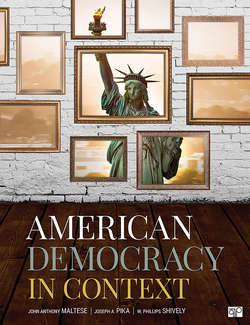Читать книгу American Democracy in Context - Joseph A. Pika - Страница 136
На сайте Литреса книга снята с продажи.
The Alien and Sedition Acts of 1798
ОглавлениеJames Madison expressed the fear that a Bill of Rights might serve merely as a “parchment barrier” against “overbearing majorities.” There was justification for that fear. As the Pulitzer Prize–winning historian Leonard Levy has noted, “any member of the Constitutional Convention could have cited examples of gross abridgments of civil liberties in states that had bills of rights.”37
Arguably, this is what happened when Congress enacted the Alien and Sedition Acts seven years after ratification of the Bill of Rights. These four separate laws were passed when the United States was under threat of war with France. One of them, the Sedition Act, allowed for the prosecution of anyone who “shall write, print, utter or publish” any “scandalous and malicious” statement against the government, either house of Congress, or the president. Since the Federalist Party controlled both the White House and Congress, this act effectively meant that critics of the Federalists—notably opposition newspaper editors representing the views of the Democratic–Republican Party—were subject to imprisonment for up to two years and a $2,000 fine if convicted.38 Ten people, including a member of the U.S. House of Representatives, were convicted under the act before it expired in 1801.39 The Supreme Court never ruled on the constitutionality of these laws, but President Thomas Jefferson later pardoned all of those who had been convicted. In fact, the Supreme Court did not rule on a free speech case until 1919.
